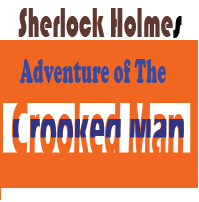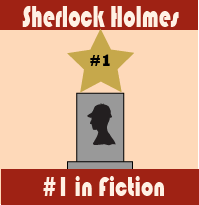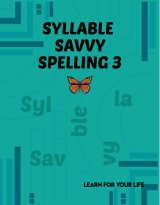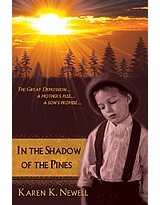Sherlock Holmes Popularity
What makes Sherlock Holmes the most popular character in literature?
We'll identify 10 traits that propelled him to the top (and keep him at the top) of the best-selling list.

Translated into more languages, dramatized by more actors, and instigated more pastiches than any other work of fiction, Arthur Conan Doyle's detective of 221b Baker Street is recognized around the world and continues to dominate literature's best-sellers.
But why?
What features created such a literary attraction? We will list some of the obvious and not so obvious elements of Sherlockian success.
But another question we can linger over. How much do you think Doyle realized these features would keep his creation on the best selling list for more than a century?
A Series Like No Other
#1 - Always Another Story
The monthly magazine was a growing phenomenon in Victorian England. Sending subscribers a regular printed periodical was a convention that had started a century before, but with widespread literacy rates the turning of time towards the twentieth century brought subscriptions to a peak. Short stories of fiction were one of the regular features of magazines. Doyle believed if the editors would print a series of stories based on the same character, it would increase its appeal.He was right. Boy, was he right!
To be fair, the first Sherlock story to be published was not a short magazine feature, but a novel Study in Scarlet published in 1887. Four years later in 1891 he converted his detective-character to the star of the first short story with the publication of Scandal in Bohemia.
Sales soared.
This program of monthly installments was definitely part of Sherlock's literary success as well as a significant part of its history. Somehow Doyle knew it would be. But it doesn't account for ALL of its success.
After all, many detective series have been produced since and non can compete. Other features account for its international acclaim.
Outer Frame and Pre-Introduction
#2 - Elements of Classical Literature and Character Development
More than the fact that it was a series, the outer frame and pre-introduction created an atmosphere around Sherlock that insured his success.As stated in the article linked to in the line above, the action plot of Doyle's short stories is well known: introduction, rising action, climax, falling action, denouement. Take any single Sherlock tale and replace the names of Holmes and Watson and you still have a decent detective story. But it is missing something.
That something is Sherlock. In the pre-introductions of each story, and scattered sparingly in the main action plot, we learn the tantalizing tale of Mr. Sherlock Holmes. He is the glue that holds readers to all 60 tales.
The stories themselves are popular literature. Enjoyable and worth reading. Once.
But the series is classic literature. In each pre-introduction we see a small piece of a different kind of detective story: a story of how one man discovers the heart of his cool-minded friend. It is a tale that has never been replicated.
Character Complexity
#3 - Character Complexity - Dual Duality
Sigmund Freud lived 1856 to 1939; Arthur Conan Doyle lived 1859 to 1930. They were contemporaries. How extraordinary that the creator of pyschoanalysis was contemporary with the creator of the most psychoanalyzed man ever.Shelock Holmes IS quite the picture of complexity. People are still psychoanalyzing and diagnosing him 150 years after he wasn't born. Every writer to take pen in hand would love to invent such a personality.
How DID Doyle do it?
Doyle's Duality
Before we talk about Sherlock's dual personality, let's look at an interesting trick in Doyle's creation. Watson and Holmes both represent - intentional or not - different parts of Arthur Conan Doyle himself.Here we have Doyle, a respectable British citizen, a military officer, a doctor, and a writer. That's Watson in a nutshell!
But what about the daring intellect? The scientific investigations? In a 1969 Interview with Doyle's son, he stated that "Sherlock Holmes was a puppet sitting on my father's knee." While his father took the inspiration for Sherlock's powers of deduction from Professor Dr. Joseph Bell; Adrian Doyle claimed the personality and character traits belonged to his father.
The characters have a certain realistic feel because they were, to some extent, real. Most of us have something of a quieter side and more out-going side. (Are you the same at a job interview as you are at a swimming party with your best friends?) We might look at Doyle (or anyone else) and distinguish these two personality traits:
- Reserved and Respectable
- Explorer and Adventurous
- Sherlock - reserved and explorer (or investigator)
- Watson - respectable and an adventurer
Holme's Duality
Watson frequently referred to Holme's dual nature:His eyes shone, and his cheek was flushed with the exhilaration of the master workman who sees his work lie ready before him. A very different Holmes, this active alert man, from the introspective and pallid dreamer of Baker Street. (Quote from F-29 F-29 Priory School.)
In recent times many assert that Sherlock was bipolar. In truth, most of us DO have a quieter and more active side. (Remember the job interview vs swimming party analogy.)
This duality was ONE of several factors that created a mystique about Sherlock.
Watson's Duality
Holmes isn't the only character with a two-sided persona. At first Dr. Watson appears to be a flat-character: dependable, reserved, proper. A foil to the dynamic detective in the room.But if you follow the story-line as it unfolds in the outer-frame, there is more to Watson than the respectable doctor. He is an adventure-seeker with a penchant for romance. (The only thing that ever gets between him and Holmes is women.)
Super Hero with Flaws
#4 Non-Fatal Flaws
Sherlock's alternations between active and quiet is part of his nature, but doesn't exactly account for his universal popularity. The fact that he and Doctor Watson formed the original superhero prototype also counts partly for his appeal.Here's a man who always gets his man. Or almost always. He can out deduct, out solve, out think, and out maneuver anyone in town.
What would happen if YOU were face to face with those cool, piercing, gray eyes? Would you be able to hide your secrets from such a powerful brain?
Bit unnerving, isn't it?
Yes Sherlock is perfect. Perfect in deduction. Perfect in moral judgment. Most of the time. In addition, he's imperfect. That makes him even more perfect.
So just what are Sherlock's imperfections. Here are just a few:
- Cocaine addiction
- All around substance abuse
- Impatient with others slower than himself. (That's everyone except Mycroft.)
- A bit arrogant. Comes with being a genius. Some call him a narcissist but that maybe going a bit too far.
- Misogynist (I think he's more scared cuz he's out of his realm.)
- Depressed when bored. (Well, duh, don't get bored.)
- Flippant
- Messy to live with
Rather than causing the public to turn away from him in shame, these actually increased his popularity as a whole. Why? Keep reading to find out.
Filling the Gap
#5 A Part for Everyone
When the Sherlock tales were written, letters arrived weekly at Baker Street from women volunteering to be Holme's housekeeper. (Amazing that they thought he was real. People still think he's real. And they STILL write letters to 221b Baker Street!)We have to wonder if these women considered what Mrs. Hudson's reaction to their request might have been - had she been real of course.
But this illustrates another aspect of Sherlock's appeal - people believe in him for his strong points and want to help him with his weak points. Those housekeeper-wanna-bees had a point - Mrs. Hudson HAD failed to keep her tenant's personal effects in pristine order. Thousands were willing to try their hand at the task.
Besides basic maid services there are other ways humanity might help their favorite crime-solver. Are you a great cook? Perhaps you could concoct a meal that was better than coffee and a cigarette on the run?
The counselors among us (professional or amateur) would just love to help this guy sort out his inner issues. The natural match-makers would have a genuine hayday trying to get him properly hooked up. And the unattached female searching for romance could imagine herself by his side.
The motherly woman also wants the opportunity to set the errant-one straight. "What do you mean you're bored? Get this place cleaned up and you won't be. And if you don't quit acting like such a boor to Watson and Mrs. Hudson I'll give you something to actually be depressed about!"
The friendly want to be-friend him. The thinker wants to participate in solving his next case. The swash-buckler would like to join Watson on their adventures: "You never know when you might need another hand in a tight spot!"
Of course, the only problem with all of this is that HE had no interest in any help from ANY of them.
The Original Man-Cave
#6 The Ultimate Boys' Club

Think about it: you live with your best friend. Neither of you have to go to school or punch a time clock. A few good cases and you are set for life financially and can act as knight in shining armor for any dame or dude in distress.
"Hey Watson, grab your gun, will ya? We need to run?"
What cops and robber movie could top THIS?!
Girls have cooties. They aren't allowed. Well Watson here, he likes girls but he can't bring them in HERE. No sir, this is an estrogen-free zone. Girls are strictly forbidden, unless they bring us cookies, er, I mean a case. Then they can come in.
Of course you need a mom: that's Mrs. Hudson. But she has no authority. Zero. In two decades neither of them made a bed or swept a floor; the silent Mrs. Hudson did it all. And the two friends came and went like the wind.
So, yeah, the boys could really get into this gig. Of course, these fans did have to grow up, punch a time-clock, and either sweep their own floors or have a little interaction with whoever in their life did.
But they could still escape back into boyhood whenever a new Sherlock fable presented itself.
Magnetic Personality
#7 Women's Attraction to the Unattainable
Yes, it's a boys' tale. But it just so happened women and girls liked him too. But for entirely different reasons.Sherlock Holmes, it turns out, possessed two of the traits most attractive to many women: strength and kindness.
His legendary strength is both mental and physical and dominates the tales. But under the surface, and running through the entire canon, is the story of the kindness and emotion of an apparently unemotional man.
It's a winning combination; or at least a selling one.
What makes him even MORE appealing to women?
He doesn't want them; he doesn't need them. So apparently women aren't the only ones who can play hard to get. He's not just hard-to-get; he's downright impossible!
Think about the utter brilliance of Doyle's concoction - a man who doesn't want women but possesses the traits that most attract them.
And - of course - you will want to learn more about Sherlock's relationship with women.
Meanwhile he lives contentedly in a (almost) male-only, romance-free zone.
Humor
#8 Amusement and Dry Humor
If one isn't impressed by his powers or charmed by his personality, there is another feature that bids the reader to the pages: humor. Sherlock is quite the wit:"Go then, my dear Watson, and if my humble counsel can ever be valued at so extravagant a rate as two pence a word, it waits your disposal night and day at the end of the Continental wire." (Quote from: H-42 Lady Francis Carafax.)
Each story gives us at least one chance to chuckle either at him or with him. And while Watson isn't known to spit out any funny one-liners, he certainly writes a few of them:
"The sardonic smile that occasionally broke through his ascetic gloom boded little good for the object of our quest." (Quote from F-25 Final Problem.)
Victorian Era
#9 Nostalgia for Days Gone By
For quite a while those who have pondered this question about Sherlock's popularity have assumed this was the REAL reason for his success: a longing for the "good ol' days."Maybe those days weren't all that good - at least for some who suffered from poverty, disease, discrimination. But there is often something beautiful about the past.
Cobblestone roads, gas lit lamps, tall black hats, and those elegant long dresses. Sigh!
Well, I hate to be the one to break it to you, but I don't think nostalgia for Victorian England is THAT big of a reason for Sherlock's swimming success.
Think about it; the series took off DURING the Victorian Era; so those original readers couldn't have been missing it all that much.
AND Holmes has been immensely successful around the world in regions where gas lit lamps, chimney sweeps, and ball-room gowns were never known.
Nonetheless, it is likely that the turn-of-the-century adds something to the charm of the tales. David Stuart Davies in his book Vintage Mystery and Detective Stories describes why that era is the Golden Age of detectives. The era had developed a systematic approach to clues, a developed police force, an advanced communication system with newspapers and telegraphs. Nonethless, the lack of DNA analysis and surveillance cameras left plenty of room for the intelligent and savvy logician.
And the Sherlock Holmes shows in the modern eras are certainly missing something. He was a man of his time and his time had an appeal of its own.
Literature's Quest
#10 The Never-Ending Search
Literature is a work of art. It is part of humanity's search for what is right, what is good, what is best among us.Told as a tale one wants to hear, literature imparts (or should impart) the wisdom of the ages to the next generation.
Doyle himself did not consider Sherlock to be serious writing. It was a distraction, an amusement. And is he IS an amusing distraction.
But before courses in ethics were offered at the great centers of learning, Sherlock and Watson wrestled with the very essence of ethics:
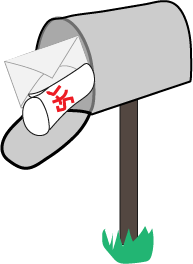
- What is justice?
- What is good?
- What beneficence do I owe this person?
- Does God exist?
- Is it ever right to lie?
Not such a bad thing for a boy waiting by his mailbox.
Buy Sherlock Holmes: The Unit Study
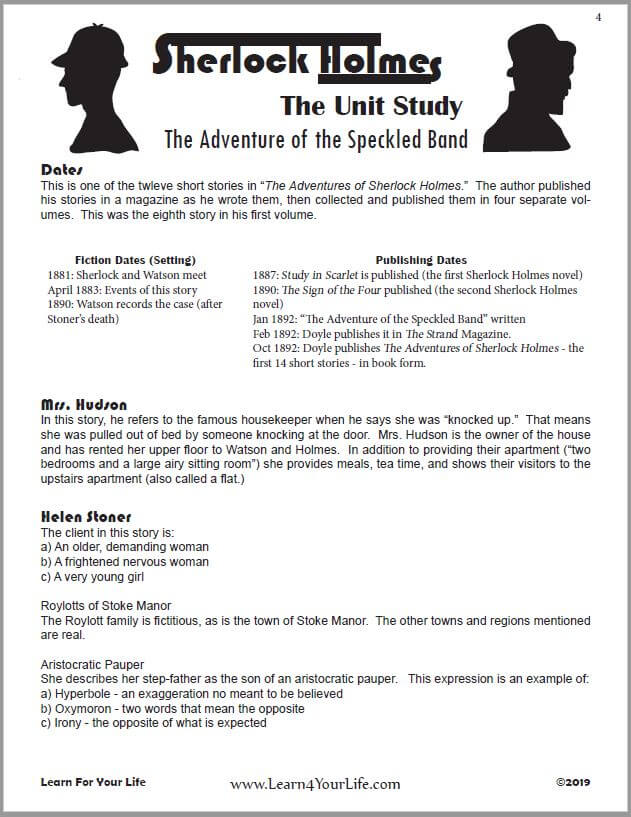

Student Guide AND Teacher's Answer Key Included
$2.99 Download - 183 pages
Eight of the most popular tales demonstrate how to investigate a detective story.
![]()
Sherlock Holmes Pages
A catalog of our pages on Sherlock Holmes.


About Our Site
Hands-On Learning







